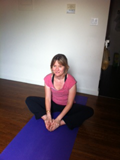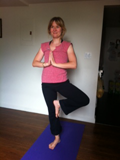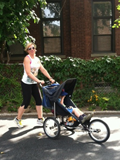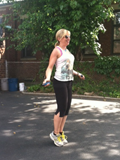EAT SLEEP MOVE = BALANCE
EAT SLEEP MOVE = BALANCE
As summer winds down and everyone begins gearing up for back-to-school chaos, the idea of balance comes to mind. It seems with so much of today’s fast paced, hectic lifestyle that the simple idea of balance becomes seemingly impossible to achieve.
“Happiness is not a matter of intensity but of balance, order, rhythm and harmony.”-----Thomas Merton
You cannot have a healthy lifestyle without balance. Living a balanced life is the ability to take all that life throws at us from work, home, relationships, health and finances, and learning how to offset these negative events with positive, healthy habits. When you are able to maintain balance, you feel that you are actually living, rather than just rushing through the days.

To bring your life more into balance, prioritize sleep, exercise, and healthy eating. Think of balance as the “sweet spot” where key aspects of your life like eating, exercise, stress management and sleep are aligned. When any one of these is off kilter, you can feel irritable, low energy, depressed, frustrated and sick. Students often ask, “What can I eat to give me energy?” The answer is – lets take a look at your sleep, stress management, diet and exercise habits as these are the real keys to having enough energy and, in turn, having balance in your life. It is said that if you feel tired and worn out each day, then you are not living in a state of balance. When you achieve balance, you naturally feel alive and vibrant, even when life throws curve balls at you.
Sleep
How do you feel when you wake up in the morning? Are you refreshed and ready to go, or groggy and grumpy? For approximately 50 million to 70 million Americans of all ages, the second scenario is all too common. We have become a nation of sleep-deprived zombies. It’s a badge of honor to say, “I only slept 4 hours last night.” Napping in the U.S means you’re lazy, while other countries equate napping with increased productivity. If you’re trying to function off of 4 hours of sleep last night, 6 hours the night before, 2 hours before that and on and on, no wonder you feel low energy! You’re in a sleep deficit!
Sleep scientists have determined there is a magical period between the times of 10pm and 2am where you’re body does all sorts of hormone regulation – including hunger and satiety hormones ghrelin and leptin – so regularly missing this sleep window means you’re not reaping the full benefits sleep has to offer - and you will be hungry, craving sugar., and irritable the next day. It’s not surprising that poor sleep habits are correlated with your waistline. Sleep deprivation causes an increase in the hormone cortisol which lowers metabolism, makes you hungry and increases belly fat.
Good sleep habits take practice. What’s really important is making sure that you have a regular sleep and wake cycle so your body naturally knows what to expect at different times of the day.
- Try to go to bed at the same time and wake up at the same time.
- Boost melatonin production at night by turning off the computer, TV, cell phones and lights at least 30 minutes before going to bed.
- Stop all caffeine by 4 pm. and avoid alcohol and large meals.
- Eat a small meal before bed containing tryptophan, which makes you sleepy (banana, 2 slices of turkey on whole grain crackers, low fat dairy.)
- Get enough exercise throughout the day so that your body is tired enough to have a restful sleep.
- And most important, keep your anxiety away before bedtime. Close your eyes and take 10 deep, slow breaths while visualizing a peaceful, restful place or activity. Concentrate on how relaxed this place or activity makes you feel.
Stress Management

With too much to do and with too little time to do it, anxiety and stress replaces happiness much of the time. It is so important to learn how to manage your moods and emotions; unfortunately, many of us were not taught healthy responses to stress, anxiety and depression. Instead, we find ourselves doing things that feel good in the short term –over-consuming sugar and caffeine, smoking, taking pills…- but these things make our bodies more stressed in the long term. Many of us also were not taught how to “sit” with certain feelings, so when we’re angry because we failed an exam, we don’t know what to do with those feelings. We just know that we want them to go away. Being mindful of our emotions takes practice. Sitting for 10 minutes and concentrating only on your breath is a remarkable practice that has proven to reduce stress and anxiety.
Healthy Diet
Two-thirds of the adult American population is either overweight or obese because they don’t know how to eat properly. What is a basic, physiological process has become complicated to the point where we regularly have students beg us to tell them what to eat, when to eat, why to eat! It is true that Americans rely heavily on a diet of processed, quick convenience foods. But, eating “healthy” doesn’t have to be difficult. Let’s start with the basic tenets of hunger and satiety. Hunger is the biological need for food while satiety is that sweet spot of satisfaction: a little more food and you’d be full, a little bit less and you’d still be hungry. This is how we’re supposed to eat, but somewhere along the way these signals have gotten messed up for many of us.
A healthy balanced diet will make you feel energized and is key to maintaining strength, concentration and a healthy immune system. The key to a healthy balanced diet is not to ban or omit any foods or food groups but to balance what you eat by consuming a variety of foods in the right proportions. In the upcoming blogs, we will focus on exactly what to eat, but for now start with our basic nutrition rules:
- Eat small meals every 3-4 hours to regulate your metabolism.
- Eat whole-grain breads and grains- one serving is one half cup.
- Eat plenty vegetables, this should take up most of the room on your plate. Fruits are also important but they do contain fructose (sugar).
- Eat fish, lean meats, and legumes as your protein sources.
- Drink plenty of water
- Try to buy organic and locally produced food.
Exercise
Try to think of exercise as your most important medicine of the day – it can fix anything! Trouble sleeping? Incorporate exercise into your life. Feeling constant worry/anxiety? Start exercising. Trouble managing your waistline? Start lifting weights! Want to stay sharp as you age? Get enough cardiovascular exercise. 
Start with 20 minutes a day. Buy a pedometer and log your steps. Your goal is 10,000 steps a day. Keep in mind that exercise is fluid. Your life will change, so make sure you’re exercise routine isn’t so rigid that you can’t roll with the punches life dishes up. 
Recently, I was at an exercise class that was very intense. It was a combination of plyometric movements followed by weights and sprints. I was drenched in sweat after the hour-long class. I realized as I was walking out once the class was over that at least half the class stayed to take the urban rebounding class that started right after my class. I couldn’t believe it! This is NOT balance. This is obsessive. Unless you’re an Olympic athlete or training for a specific event, you reap no further health benefits by doing such rigorous training and only increase the likelihood of injury. Exercise shouldn’t be torture; it should be invigorating.
So for the next few weeks, lets start by getting more balance into your life. Pick one healthy habit from above and start incorporating it into your daily life. If you are out of balance by doing too much- STOP, slow down and start living a full life.
Top of Page | Bio - Lana Zinger < Previous Page | Next Page > Fitter Body, Fitter Brain: How working out can make you smarter



